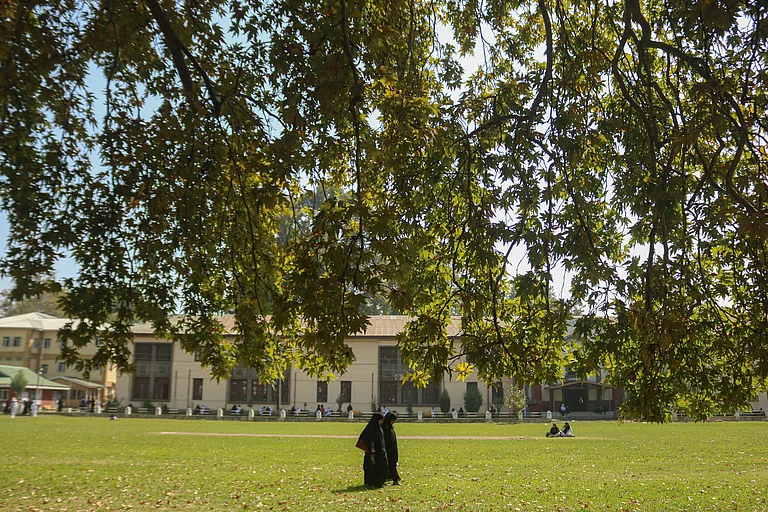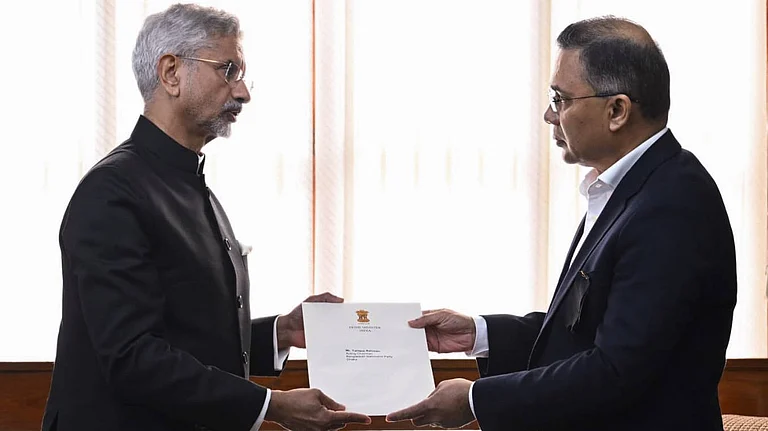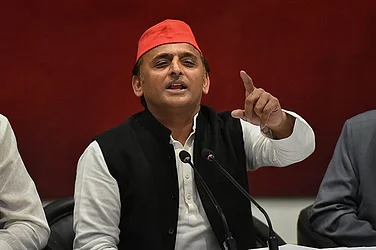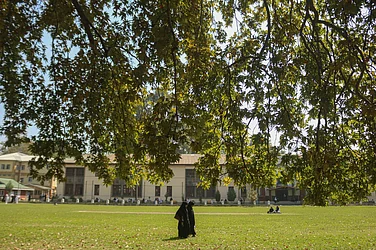At the backside of the Jharkhand High Court, flanked by the busy Doranda Market, under the yellow tarpaulin that shows the cracks through which some rays of hope still come, stands Zubair Ahmed, an egg vendor in his early fifties. His sharp chin though shows determination, the not-so-masculine eyes sometimes slip into tears- Iske liye toh hum Jharkhand nahi mange the… (We didn't fight for such a Jharkhand).
Zubair, who along with thousands of his Adivasi and Moolvasi comrades invested their lives for the separate statehood was devastated at the actions of the police on June 10 when two youths had been killed in police firing during the protest against former BJP spokesperson Nupur Sharma's derogatory comments on Prophet Mohammad. “We were like Guldasta (bouquet of flowers) where the difference in identity never meant separation. We all were Jharkhandis,” Zubair, who was the former central committee member of Jharkhand Mukti Morcha told me.
Similar words I encountered at Simaliya village in Ranchi district where I went to meet Padmashree Madhu Mansoori, one of the finest folksingers of our time. Suraj Hansda, a 47 years old man who was rushing to block office as his fingerprints were not matching with the data resulting into loss of three months' government ration that they receive through the food security measures, told me, “We know our issues will never come to the news. Rather, a few researchers like you will come and go. Nobody actually cares for us.
I carried these words of Suraj with me for a long time. It also took me back to the days when I was heading a journalism department of a university in Ranchi. As I was teaching my students the definition of news, one of them, Suman Oraon (name changed on request) from Khunti district referring to John Bogert's famous definition, “when a dog bites a man is not news but when a man bites a dog is news” asked me, “Sir, what about elephants destroying our house? Will it be a news or should we have to wait until a man hits back? His friends though immediately laughed out loud (in mere ignorance); I was quiet-silent throughout the days unless I could have an answer. It was 2017.
Since then, several forests have been cut down in Jharkhand- displacement of Adivasis due to developmental projects or mining have become more mundane and communalization has become rampant. I started writing for popular media regularly getting out of the academic cocoon that pushes us behind the paywall. I was much convinced about highlighting the issues of real people.
However, in a polarised society, two questions throughout haunted me – Am I the right person to represent any of the people I am writing about? Doesn’t my Savarna identity and Brahminical experience are the major deterrence? When I read the renowned scholar Gopal Guru’s 1995 research paper Dalit women talk differently, I understood my limits. But what to do? How to navigate through the narrow lanes that gradually collapse at the end by the growth of phallic buildings that crash down the demands of justiciable rights through the tropes of development?
The second question was inevitably regarding the selection of media for whom I wanted to write. In the cacophony of polarised media houses, there was hardly any space to find out the nuanced space where the arguments are valued over the rhetoric. I was already a part of the world of media where sometimes dead bodies become mere numbers and ‘empathy’ is the last word to find an ally in the male-dominated editorial boards.
However, after spending years in Ranchi as a teacher, ethnographer and a journalist when I joined Outlook, I found a new journey awaiting me. Coincidentally, the day I joined the organization, Hemant Soren government announced their intent to clear the 1932 domicile policy that would demarcate the Jharkhandis and would offer them reservations in different jobs. The anti-domicile campaigns notwithstanding, we came out with several pieces that analysed the possibilities and limitations from the ground.
The next big moment for me was to work on Ramayana in Jharkhand. Though I stayed there for years, it was beyond my scope to look into the prevalence of Sita in the Jharkhandi folk culture. As our editor commendably was looking for many Ramayanas across the country at a time when the monologic Rama is celebrated at the cost of its diversity and A K Ramanujan’s 300 Ramayans is dropped from Delhi University syllabus, I took up the story of Jharkhand. Upon researching and talking to scholars, I realised the land as an abode of Sita that perhaps would have been out of my reach had I not joined this profession.
My visit to Ujjain, one of the ancient cities of the subcontinent to cover PM Modi’s inauguration of Mahakal temple took me to a world where the religion is diverse and it is negotiated every day at the economistic level as well. While doing story on the flower venders who had been primarily evicted from the temple complex and had not been offered proper rehabilitation taught me lessons of hope and despair. The statement of Purab that Mahakal doesn’t return anybody empty hands still resonate in my mind.
However, toward the end of the year when I, on the suggestion and advise of our editor started working on Ukrainian poetry as a documentation of war, I explored a new world. Poems are not only the metaphors of resistance, it becomes prose, history or narratives for a war-torn country. My conversation with Iya Kiva, one of the young Ukrainian poets also made me learn once again about a constant human feature that even Suraj taught me in Jharkhand: Resilience, an essence of survival.
My encounter with journalism though started more than a decade back at Kolkata, my shift to academics and then coming back to the popular writing and finally to full-time journalism is, I feel, a journey of finding mediums. In my childhood, during early 90s, in a vernacular newspaper, I read an old interview of one of the finest filmmakers of our time Ritwik Ghatak. As he was asked, why you chose cinema as the medium, he replied, "The day I will find any other medium through which I can reach more people than cinema, I will kick it off and will try my hands on it."
Apologies for any comparison. But for me, it is all about the medium you choose to communicate and yes, I can certainly, for now at least, say, that I have chosen the right one.



























